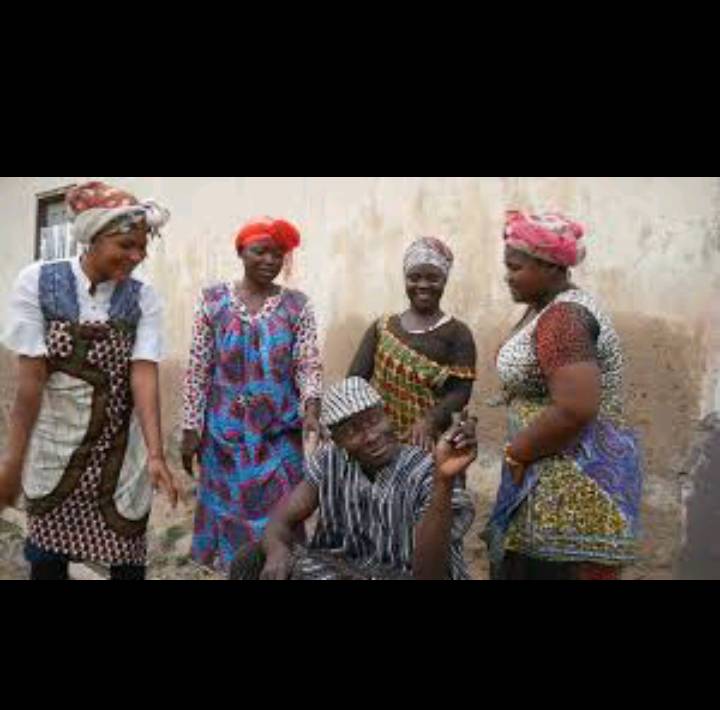ACT ONE The scene is the backyard of a
house by the seaside. The rear side of the house is on stage right, the far corner prodding into the stage. It is painted white, with two windows (both visible to audience), painted black. We see one or two stools about Midway stage left is a large petrol drum used for storing water. The lid to this is a heavy wooden slab. Upstage are four or five railings on which fishing nets are spread to dry. Beyond these are a few coconut trees silhouette against the setting sun. The time is late afternoon. When the curtain goes up, we see Sumako standing upstage (back to audience), intently gazing into the distance. When he turns round, we see a disturbed old man greying on the temples. He is a bit starchy in his movements and looks rather strong for his age. He walks down right, plants himself on a stool and starts mending a fishing net. He quickly absorbs himself in this occupation with an occasional pause to remove the pipe from his mouth.
A moment later, Duella enters--down left. She has a mature body which she carries with unaffected grace and defiance. She's about twenty. She is carrying a pail of water on her head; she goes to the drum and turns an enquiring eye to her father, but the old man is so preoccupied that he does not notice this.
DUELLA: Father! SUMAKO: [As if roused from some meditation] What? DUELLA: [Impatiently] The lid! SUMAKO: Of course, of course. [He goes to remove the lid and helps DUELLA empty water into drum.] Duella, your brothers... they haven't returned from sea. DUELLA: They have all the time in the world. SUMAKO: And what does that mean? DUELLA: They can stay there as long as they wish to. SUMAKO: There was a strong gale this afternoon. DUELLA: So? SUMAKO: They are my children. DUELLA: What about me, father, what about me? (She picks up the pail and storms out-left.) SUMAKO: [To himself, rather ruefully] I didn't mean to imply anything. [He shrugs his shoulders and returns to his occupation, A moment later, we hear sharp knocking---off right, and a male voice calling: "Agoo! Agoo! Anybody home? Agoo, anybody home?"] SUMAKO: Come round the backyard, whoever you are. [JOSHUA appears-right. He is a young man, tall lanky, walks and speaks with stubborn confidence. He is carrying a travelling sac which he dumps on the ground with a sigh of relief.] SUMAKO: There is no fish, my boys haven't returned What is the matter with you people?
JOSHUA: I've not come to buy fish. SUMAKO: [Studying JOSHUA and noticing the sac for the first time] You've come a long way? JOSHUA: As you can see, yes. SUMAKO: Oh, then maybe you can quit your impudence and tell me what you want. JOSHUA: Is your name Sumako? SUMAKO: Yes. JOSHUA: The fisherman? SUMAKO: Now listen lad, I've no time for idle talk. Can't you see I'm busy? [Then on second thought.] You haven't brought me bad news about them; have you? Tell me quick! JOSHUA: I don't know what you're talking about. SUMAKO: My sons, what happened to them? JOSHUA: I'm a stranger in these parts, and I know nothing about your sons. I was told you could help me, that's why I came. SUMAKO: Oh, I see. So there's nothing, no news. JOSHUA: What's all this about your sons anyway? SUMAKO: Forget it, it's nothing. Now what do you want? JOSHUA: Are you Sumako, the fisherman? SUMAKO: I said that before, didn't I? JOSHUA: You were going on about your boys I didn't hear it. SUMAKO: I am Sumako, everybody knows that. But I don't go to sea anymore. Too old, understand?
My sons do, they are at sea this very moment. I expect them any minute from now. JOSHUA: Oh good. SUMAKO: What's that? Do you know them? JOSHUA: No, but I guess they could do with some help. SUMAKO: Are you a fisherman then? JOSHUA: No. SUMAKO: No? JOSHUA: That's why I'm here. I want to become one, a good one. I don't mind serving an apprenticeship with your boys. SUMAKO: A rather peculiar way of asking for a job, wouldn't you say? I imagine from your crude behaviour that you don't know a better approach. JOSHUA: I'm not used to begging, so make up your mind. SUMAKO: Pity. Whoever brought you up must be ashamed of himself. JOSHUA: My mother did. SUMAKO: Well go back to her and ask her to start all over again. Understand? Go back to your mother. JOSHUA: She's dead. SUMAKO: Oh, I see. JOSHUA: Don't you feel sorry for me, because I'm glad she's off my back. SUMAKO: I don't indulge in sentimentality. It's a luxury I can't afford.
JOSHUA: Oh good. Then I'm sure we shall get on fine. Say you got some water to drink? SUMAKO: In that thing over there. Help yourself. [JOSHUA helps himself.] What about your father? JOSHUA: Dunno. SUMAKO: What? JOSHUA: Never saw him. I don't mind telling you that I was born a bastard, but mind you I didn't grow up in poverty. On the contrary, my cradle was lined with silk and velvet. My mother provided for me. I had everything I wanted, even my own special world with everything in it except a father. I was to believe that my father was some kind of a hero who died fighting for some good cause. SUMAKO: What cause? JOSHUA: No cause, because there wasn't one. I was only to believe that. It worked for some time till I began to ask the same question-what cause? There was no answer because there was no man. My mother didn't even know who the man was. How could she? They were many, she was a commodity on the market. She got paid of course. SUMAKO: She had to live, she was probably forced into it. The life you people lead in the cities. Your mother must have been a very sad woman. JOSHUA: A very strong woman, strong and revengeful. She made all men pay for the insult. SUMAKO: There was only one woman who once did that. She raised an empire from little rooms and made men slave for her. Glad she is no more.




No comments yet
Be the first to share your thoughts!